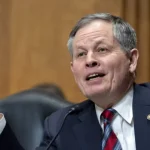Sen. Mark Warner (D-VA) argued that the best remedy for the Silicon Valley Bank collapse would be an acquisition.
Stopping short of ruling out support for a bailout, Warner underscored the importance of SVB depositors receiving their money back and emphasized the speed with which SVB’s collapse came about.
BIDEN PROPOSES NEARLY $7 TRILLION TAX-AND-SPEND BUDGET THAT WOULD NOT STABILIZE THE DEBT
“The best outcome will be – can they find a buyer for this SVB bank today, before the markets open in Asia later in the day. That would be the best,” Warner told ABC’s This Week host Martha Raddatz.
Last Wednesday, SVB revealed that it sold off a trove of securities at a loss and moved to raise capital, which sparked panic from venture capital firms and catalyzed a run on the bank. By Friday, SVB collapsed and was taken over by federal regulators.
SVB was the 16th largest federally insured bank and the largest to plunge into turmoil since Washington Mutual crashed during the 2008 financial crisis. Warner, who sits on the Senate Committee on Banking, Housing, and Urban Affairs, noted the timeline of its demise.
“This bank bought long-term treasuries, interest rates went up, and they got caught in a bind. But what was different in your report made clear, $42 billion came out of this bank on one day — on Thursday. And frankly, some actors, I think, we’re accelerating that run. To put in comparison, Washington Mutual during the crisis … lost $16 billion dollars over 10 days,” Warner stressed.
During the Trump administration, Warner was one of 17 Democrats who backed a mid-sized bank rollback in Dodd-Frank, a comprehensive banking regulation package passed in the aftermath of the 2008 financial crisis. Warner helped author the original Dodd-Frank bill.
“I do think these mid-sized banks needed some regulatory relief,” Warned said.
Federal Deposit Insurance Corporation policy dictates that bank deposits are insured up to $250,000, but the vast majority of SVB’s deposits were worth over $250,000. Regulators have reportedly been working to ensure that depositors who had over $250,000 stashed in SVB will get their money back.
“Shareholders and the bank are going to lose their money, let’s be clear about that. But the depositors can be taken care of,” Warner stressed. “There’s generally been a feeling that the people responsible, the shareholders of the bank, ought to lose their money. Depositors have been a different circumstance.”
CLICK HERE TO READ MORE FROM THE WASHINGTON EXAMINER
Warner also emphasized the risks posed by SVB’s collapse to working families.
“I know it’s called Silicon Valley Bank, but the startups literally are all across the country, and they’ve got to pay their bills this week,” Warner said. “If other regional banks, midsize banks, if people get nervous, they may start taking their money out of those banks and putting it into the large money center banks. We don’t want further consolidation.”







